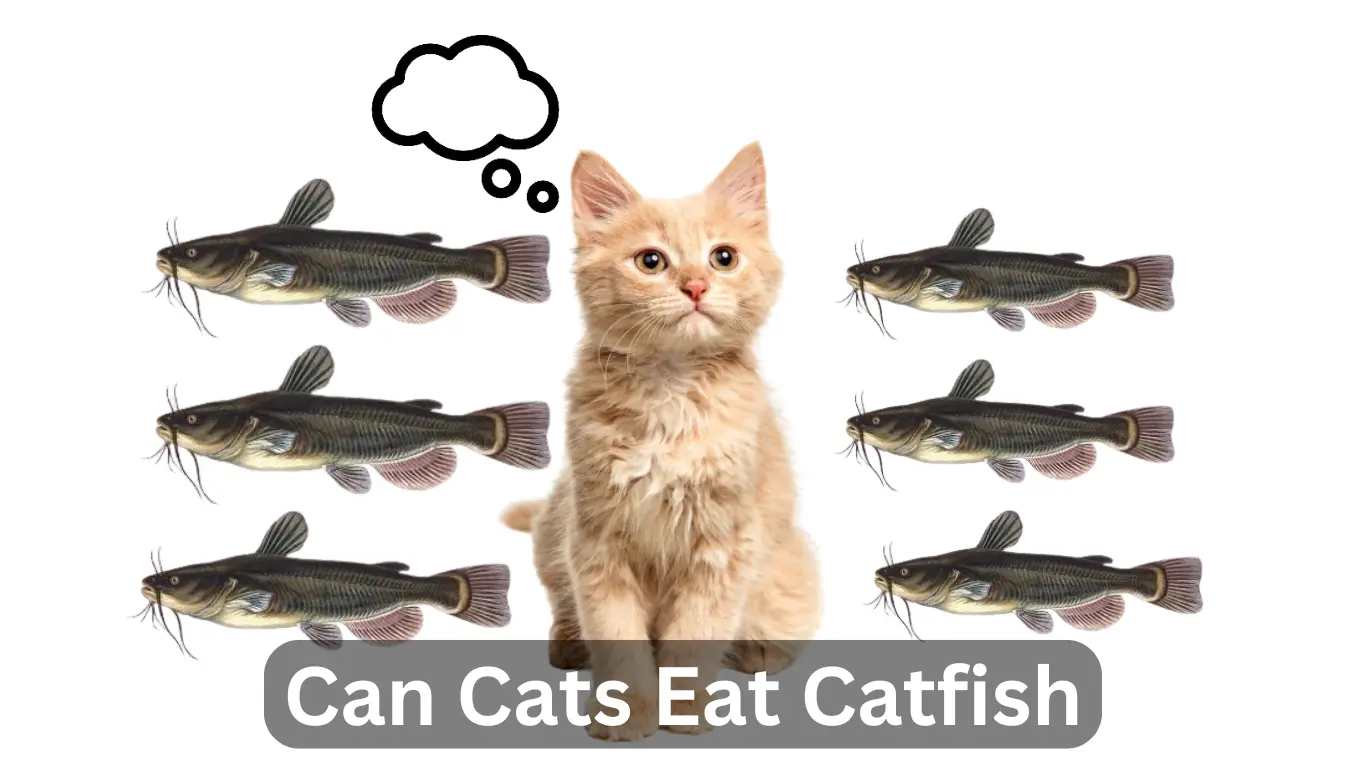Can Cats Eat Catfish? A Comprehensive Guide
As we know, catfish is a rich source of protein and also contains omega-3 fatty acids, vitamins like B12 and minerals such as phosphorus. But the question is Can cats eat catfish?
Today, in this comprehensive guide we are going to discuss whether is catfish safe for cats or not and will also discuss their health impacts ( benefits and risks ) on cats.
So let’s get started to find the answer to “Is catfish safe for cats to eat or not?“
Can Cats Eat Catfish?
Can cats eat catfish? Yes, cats can eat catfish! Catfish are safe for cats to eat and can provide a tasty source of protein in their diet. Just make sure the catfish is cooked thoroughly to avoid any potential risks, like bacteria or parasites. Provide it gradually into the cats’ diet to ensure they tolerate it well. Always consult with your vet if you have any concerns about your cat’s diet or health.
What Kinds of Nutrients Are In Catfish?
A catfish is a nutritious option. It provides them with essential nutrients like protein, which helps in building strong muscles. Additionally, catfish contains omega-3 fatty acids that are beneficial for their skin and coat health. It also offers vitamins like B12, which supports their nervous system, and minerals such as phosphorus, which are vital for their bone health. Feeding your cat catfish can contribute to their overall well-being and keep them healthy and happy.
Health Benefits Of Catfish To Cats
Here’s a more detailed explanation of the health benefits of catfish for cats:
Rich in Protein:
Catfish serve as an excellent source of protein for cats. Protein is crucial for maintaining lean muscle mass, aiding in the repair and growth of tissues, and supporting overall bodily functions. It provides the essential amino acids that cats need for optimal health and vitality.
Source of Omega-3 Fatty Acids:
Catfish contains omega-3 fatty acids, such as EPA (eicosapentaenoic acid) and DHA (docosahexaenoic acid), which are beneficial for cats in several ways. These fatty acids support cardiovascular health by helping to maintain proper heart function and promoting healthy blood circulation. Additionally, omega-3s possess anti-inflammatory properties, which can alleviate symptoms of arthritis and other inflammatory conditions in cats. Furthermore, omega-3s contribute to healthy skin and a glossy coat, reducing itching, and flakiness, and promoting fur softness and shine.
Nutrient-Rich:
Catfish is a nutrient-dense food that provides essential vitamins and minerals necessary for a cat’s well-being. It contains vitamin D, which aids in calcium absorption and bone health, and vitamin B12, essential for nerve function and the production of red blood cells. Catfish is also a good source of phosphorus, crucial for maintaining strong bones and teeth, as well as selenium, an antioxidant that supports immune function and helps protect cells from damage.
Low in Saturated Fat:
Compared to certain meats, catfish is relatively low in saturated fat. This makes it a healthier protein option for cats, as excess saturated fat consumption can lead to weight gain, obesity, and associated health issues such as diabetes and cardiovascular disease. Choosing lean protein sources like catfish can help maintain an ideal body condition and promote long-term health in cats.
Easy to Digest:
Catfish is highly digestible for cats, making it an ideal protein source for cats with sensitive stomachs or digestive issues. Its gentle nature on the digestive system makes it suitable for cats transitioning to new diets or recovering from gastrointestinal upset. Additionally, easy digestibility ensures that cats can efficiently absorb and utilize the nutrients present in catfish, maximizing its nutritional benefits.
Variety in Diet:
Introducing catfish into a cat’s diet adds variety and diversity to their meals, which is beneficial for both physical and psychological well-being. Offering different protein sources like catfish prevents dietary monotony, stimulates appetite, and encourages healthy eating habits. A varied diet also ensures that cats receive a wide spectrum of nutrients, reducing the risk of nutritional deficiencies and promoting overall health and satisfaction.
Incorporating catfish into your cat’s diet can contribute to their overall health and happiness, but it’s essential to consult with your veterinarian to ensure it aligns with their dietary needs and any specific health considerations.
When And Why Can Catfish Be Harmful To Cats?
Here’s a detailed explanation of when and why catfish can be harmful to cats:
Raw or Undercooked Catfish:
Why it’s harmful: Raw or undercooked catfish can harbour harmful bacteria, such as Salmonella and E. coli, as well as parasites like tapeworms and roundworms. Consuming raw or undercooked catfish puts cats at risk of foodborne illnesses, which can lead to symptoms like vomiting, diarrhoea, dehydration, and in severe cases, organ damage or failure.
Bones in Catfish:
Why it’s harmful: Catfish bones can pose a choking hazard or cause internal injuries to cats if ingested. While some bones in catfish are small and may pass through the digestive system without issue, larger or sharper bones can become lodged in the throat, oesophagus, stomach, or intestines, leading to choking blockages, or perforations.
High Sodium or Seasonings:
Why it’s harmful: Catfish prepared with high amounts of sodium or seasoned with ingredients like garlic, onions, or spices can be harmful to cats. Excessive sodium consumption can lead to electrolyte imbalances, dehydration, and kidney problems in cats. Additionally, certain seasonings and ingredients commonly used in human cooking can be toxic to cats and cause gastrointestinal upset, organ damage, or other health issues.
Fish Allergies:
Why it’s harmful: Some cats may have allergies or sensitivities to fish proteins, including those found in catfish. Allergic reactions in cats can manifest as skin irritation, itching, hair loss, ear inflammation, gastrointestinal upset, or respiratory issues. It’s essential to monitor your cat for any adverse reactions after introducing catfish into their diet and consult with a veterinarian if signs of an allergy or sensitivity arise.
Mercury Contamination:
Why it’s harmful: Catfish, particularly those from polluted waters, may contain elevated levels of mercury, a heavy metal toxin. Chronic mercury exposure can lead to neurological problems, kidney damage, and reproductive issues in cats. While catfish from reputable sources and properly regulated fisheries are generally safe, it’s crucial to be cautious when feeding catfish sourced from potentially contaminated environments.
Understanding these potential risks associated with catfish can help cat owners make informed decisions about incorporating it into their cat’s diet. To ensure the safety and well-being of your cat, it’s advisable to cook catfish thoroughly, remove bones, avoid high sodium or seasoned preparations, monitor for allergic reactions, and source catfish from reputable suppliers.
Can Cats Eat Raw Catfish?
The answer is no. Feeding raw catfish to cats is not recommended due to the potential presence of harmful bacteria like Salmonella and parasites such as tapeworms and roundworms. Consuming raw fish can lead to food poisoning and gastrointestinal issues in cats, including vomiting, diarrhoea, and dehydration. Cooking catfish thoroughly helps to kill any harmful pathogens, making it safer for cats to eat. Additionally, cooking also helps break down the fish’s proteins, making them more digestible for cats. Always prioritize your cat’s health and well-being by ensuring that any fish they consume is properly cooked before serving.
How Do You Cook Catfish For Cats?
Cooking catfish for cats is simple and can be done in a few easy steps:
- Select Fresh or Frozen Catfish: Choose fresh catfish from a reputable source or opt for frozen catfish that has been properly stored and thawed in the refrigerator.
- Remove Bones: Check the catfish carefully for any bones and remove them to prevent choking hazards or internal injuries.
- Cooking Methods: Catfish can be cooked in various ways, including baking, grilling, or poaching. Avoid using excessive oil, butter, or seasonings, as these can be harmful to cats.
- Cook Thoroughly: Ensure that the catfish is cooked thoroughly to kill any harmful bacteria or parasites. Cook until the flesh is opaque and flakes easily with a fork.
- Cool Before Serving: Allow the cooked catfish to cool to a safe temperature before serving it to your cat. Hot food can cause burns or discomfort to your cat’s mouth and digestive system.
- Serve in Small Portions: Cut the cooked catfish into small, bite-sized pieces suitable for your cat’s size and preferences. Monitor your cat’s reaction to the cooked catfish and adjust portion sizes as needed.
By following these steps, you can safely cook catfish for your cat to enjoy as a nutritious and tasty treat.
What Kind Of Diet Does Your Cat Need?
Your cat needs a balanced diet that provides all the essential nutrients they need to stay healthy and happy. This includes:
- High-Quality Protein: Cats are obligate carnivores, meaning they need meat to thrive. Look for cat foods with real meat as the main ingredient to ensure they get enough protein for muscle maintenance and growth.
- Healthy Fats: Fats are a concentrated source of energy for cats and also help maintain healthy skin and a shiny coat. Look for foods with omega-3 and omega-6 fatty acids, which are beneficial for your cat’s overall health.
- Essential Vitamins and Minerals: Cats require specific vitamins and minerals, such as vitamin A, vitamin D, taurine, and calcium, to support their immune system, vision, bone health, and more. Make sure their food is balanced and complete to meet these needs.
- Water: Cats need plenty of fresh, clean water to stay hydrated, especially if they primarily eat dry food. Always provide access to water throughout the day to prevent dehydration.
- Taurine: Taurine is an amino acid that is essential for cats’ heart health, vision, and reproductive function. Make sure your cat’s diet includes adequate levels of taurine, as cats cannot produce it themselves.
- Balanced Diet: Offer a variety of foods, including wet and dry food, to ensure your cat gets a balanced diet. Wet food can provide extra hydration, while dry food can help maintain dental health.
- Portion Control: Monitor your cat’s food intake and adjust portion sizes based on their age, weight, activity level, and health status to prevent obesity or undernourishment.
By providing your cat with a diet that meets these nutritional requirements, you can help them live a long, healthy life. Consult with your veterinarian for personalized dietary recommendations based on your cat’s specific needs and preferences.
Conclusion:
In conclusion, cats can safely enjoy catfish as part of their diet, as it offers valuable nutrients like protein, omega-3 fatty acids, vitamins, and minerals. However, it’s crucial to cook catfish thoroughly to avoid potential risks like harmful bacteria or parasites. Introducing catfish gradually and monitoring for any adverse reactions is recommended.
Remember to consult with your veterinarian to ensure it aligns with your cat’s dietary needs. By providing a balanced diet rich in high-quality protein, healthy fats, essential vitamins, and minerals, along with plenty of water and proper portion control, you can help your cat thrive and enjoy a long, healthy life.
FAQs:
What Fish Is Toxic To Cats?
Raw fish, particularly varieties like tuna, can be toxic to cats due to potential bacteria and parasites. It’s safest to avoid feeding raw fish to your feline friend and opt for cooked options like catfish instead.
Can Cats Eat Catfish Every Day?
Feeding cats catfish every day isn’t necessary or recommended. While catfish can be a nutritious part of their diet, it’s essential to offer a variety of foods to ensure they get all the nutrients they need for balanced health.
What Kind Of Fish Can Cats Eat?
Cats can safely eat cooked fish like catfish, salmon, and trout in moderation. Avoid feeding them raw fish to prevent potential bacterial or parasitic risks.
Can Cats Eat Catfish With Bones?
It’s best to remove bones from catfish before feeding it to cats to prevent choking hazards or internal injuries. Offering boneless catfish ensures their safety during mealtime.
Is Fried Fish OK For Cats?
Fried fish is not recommended for cats as it can contain high levels of unhealthy fats and harmful additives. Opting for cooked fish prepared without excessive oil or seasonings is safer and healthier for your feline friend.
Can Cats Get Fish Poisoning?
Yes, cats can get fish poisoning from consuming raw or improperly cooked fish, which may contain bacteria, parasites, or toxins harmful to their health. It’s important to ensure that any fish offered to cats is thoroughly cooked and safe for consumption.
Is Chicken OR Fish Better For Cats?
Both chicken and fish can be good for cats in moderation, but it’s important to ensure a balanced diet with essential nutrients to maintain their health.







